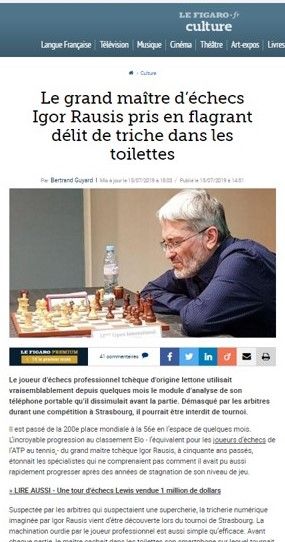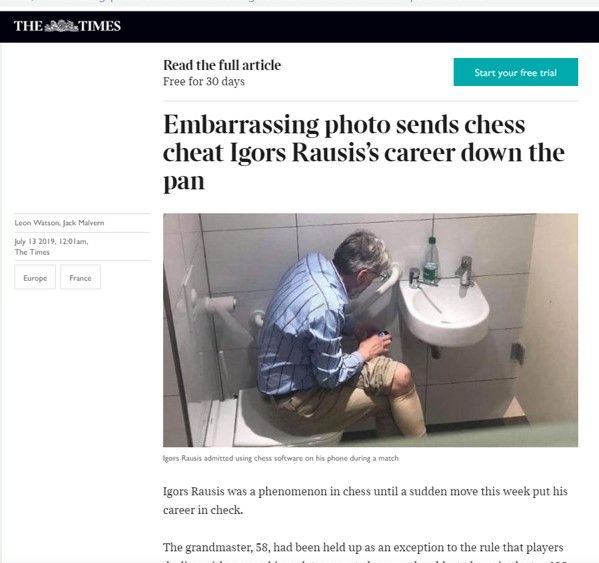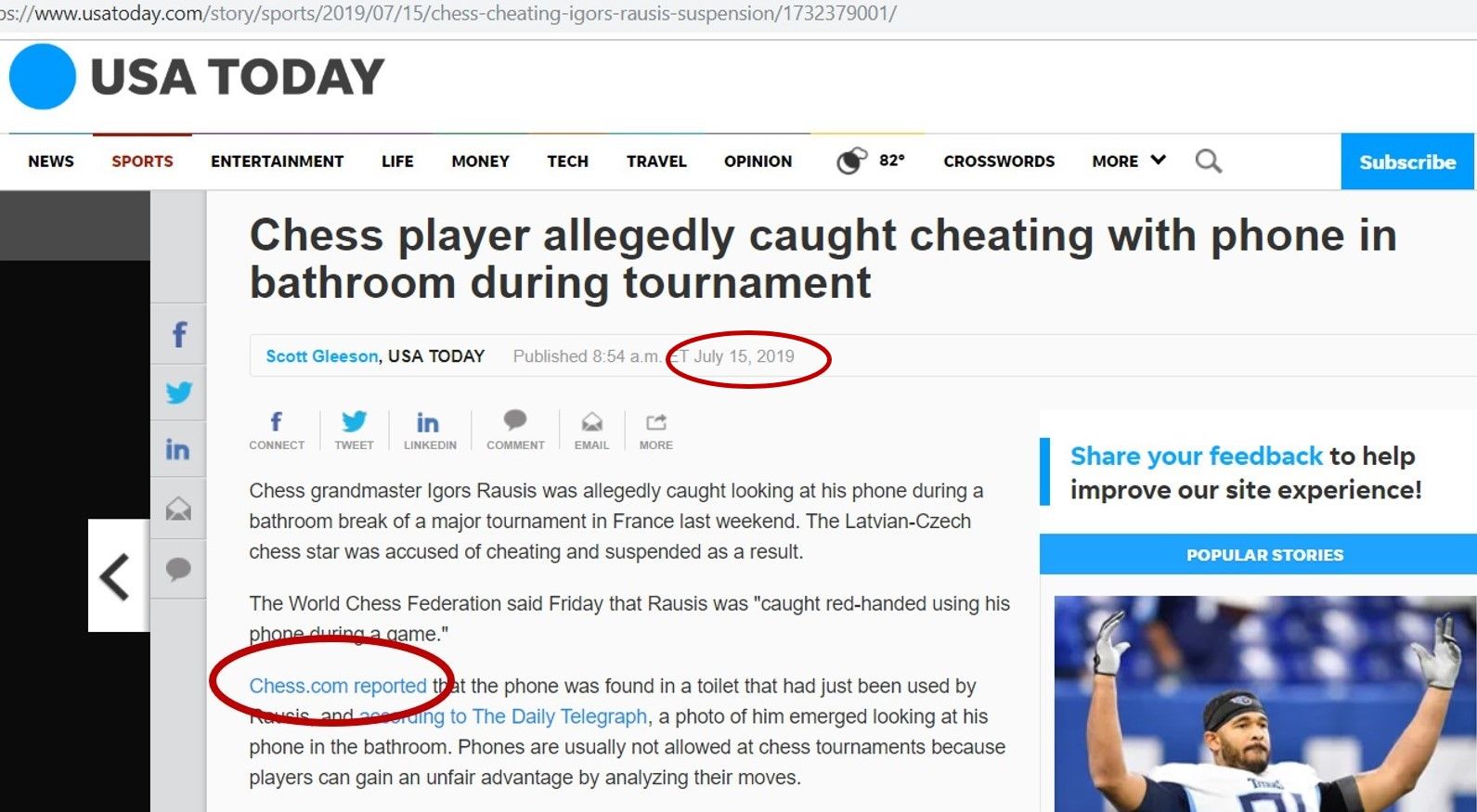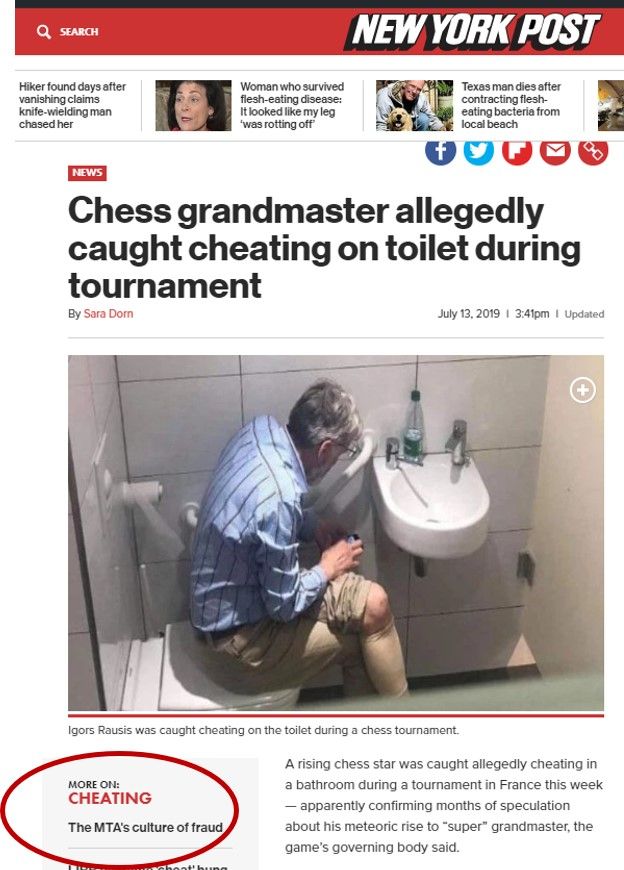
How Chess.com Led Other Media In Reporting Chess Cheating Scandal
The world was shocked a few days ago when a Latvian-Czech grandmaster was caught cheating during an open tournament. GM Igors Rausis confirmed in a written statement that he had used his phone during a game at the Strasbourg Open (July 10-14) in France. As a result, the FIDE Ethics Commission is now dealing with the case, and even the French police have been involved.

The world reaction was swift. Peter Doggers’ news account, posted on July 12 on Chess.com, was widely read immediately, and the number of readers has continued to grow. As I add this post to my blog, the number of worldwide readers has surpassed 47,000. This article is outpolling the article by Doggers about Magnus Carlsen’s return to his highest rating of 2882—by almost a third more readers! Most news article rarely attract so many readers.

The interest in the scandal is also seen in the comments—more than 400—posted to the online article. Some raise questions about the integrity of the game of chess as well as how the confession was obtained from Rausis. Many launch off vindictively about the accuracy of the other posts and disagree disagreeably.

Putting that chatter aside, what caught my attention is how Chess.com has been the primary source of information about Rausis' misconduct for major news media. A primary reason is that Doggers “broke” the story early—at 1157 UTC (or 4:57 a.m. Pacific time) on July 12—well before the international news media knew about it. (I read the article within an hour after it had been posted online because I had received a notification from Chess.com—I follow Doggers on this site—and was fascinated to watch the number of readers grow rapidly.)

In addition to the timeliness of the article, it contains newsworthy details, more than just reporting that misconduct has occurred. In his article, Doggers directly quotes Rausis and provides a detailed analysis of how Rausis’ rating had fluctuated around 2500 for at least 10 previous years before remarkably (and suspiciously) increasing six years ago from 2513 to almost 2700.

Doggers also quotes two other sources who add important depth to the article:
- Yuri Garrett, FIDE's Fair Play Commission Secretary, and
- Kenneth W. Regan, associate professor at the University at Buffalo School of Engineering and Applied Sciences, who has developed a model that makes statistical tests for cheating with computers at chess and advised FIDE for several years.

As a result, the use of Doggers' article by a variety of media soon after it went live on Chess.com shouldn’t be surprising:
- In quoting Rausis, the Bleacher Report cites “per Chess.com.” In addition, B/R cites ESPN.com.
- ESPN.com itself, however, uses Chess.com as its primary source.
- Fox News says that Rausis “told Chess.com” and then repeats a quotation in Doggers’ article.
- Other media quoting Chess.com included Deadspin, Digital News, Newser—all online news sources.

The normally staid Washington Post and USA Today didn’t report the scandal until July 15 (not too timely)—three days after Doggers' article had been uploaded. Again, Chess.com is their primary source.

Although most news accounts were serious, some media acted like tabloids in how they described the misconduct in their headlines.
- Some veered into drama such as this headline by The Times: “Embarrassing photo sends chess cheat Igors Rausis’s career down the pan.”
- ESPN News was even more dramatic and teased with adding “flush” and “toilet” in its headline: “Grandmaster Flush: Chess player cheated in toilet.”
- Similarly, the Bleacher Report couldn’t leave “toilet” out of its headline: “Chess Grandmaster Igors Rausis Caught Cheating with Cellphone Found in Toilet.”
- Also keeping “toilet” in the headline was The Guardian (based in London): “Chess grandmaster admits to cheating with phone on toilet during the tournament.”
- The headline of Deadspin, an online sports news outlet, was “Chess Grandmaster Caught Using His Phone While On The Toilet During A Tournament.
- Rather than “toilet,” Fox News cleaned up slightly with “bathroom” in its headline: “Chess grandmaster allegedly caught cheating in bathroom during tournament.”
- As did USA Today with “Chess player allegedly caught cheating with phone in bathroom during tournament.”
- Likewise, The Washington Post with “A chess grandmaster’s success was ‘unreal.’ Until he was caught in the bathroom with a phone.”
- Contrast those with Doggers’ business-like headline of “GM Igors Rausis Under Cheating Investigation.”

Many news articles about the scandal were accompanied by “stock” photos, simple pictures of chess scenes such as a chessboard with pieces. Not The Times, Britain’s oldest national newspaper. Not content with a flamboyant headline, it also included a hidden-camera photo of the bathroom scene with its story. The same photo was also used by New York Post, The Telegraph, and Deadspin – as well as the daily newspaper Blesk in the Czech Republic.

The coverage in Blesk was most damning of all. (Rausis has been representing the Czech chess federation since 2007.) Its headline (shown in the screen image near the top of this article) translated in English is, “The chess grandmaster shamed the Czech Republic. He cheated on the game, chased him out with his cell phone on the toilet.”

Most media were more captivated by where the cheating occurred—in a bathroom—than on the crux of the story: a highly ranked grandmaster had resorted to cheating.
What isn’t surprising to me is that Chess.com had the details right and reported the information accurately and quickly without drama. (Until the next breaking news occurs, I’m back on Puzzle Rush. Please don’t interrupt me unless it’s important.)

Thanks for reading. If you like this article, please click above to follow my blog. In addition to Chess.com, where else did you read about the scandal?
